An Interview with Lee Anderton of Andertons Music Company
How The Beatles inspired a father and his teenage son into opening a London-area music store that’s still going strong 60 years later.
By Ron Denny, Gretsch Contributor.
With Fred and Dinah Gretsch celebrating a combined 102 years of experience in the music industry in 2024, the 141-year-old Gretsch Company honors another long-time, multi-generational family business with this tribute to Andertons Music Co. located in Guildford, a quaint town in west Surrey, England.
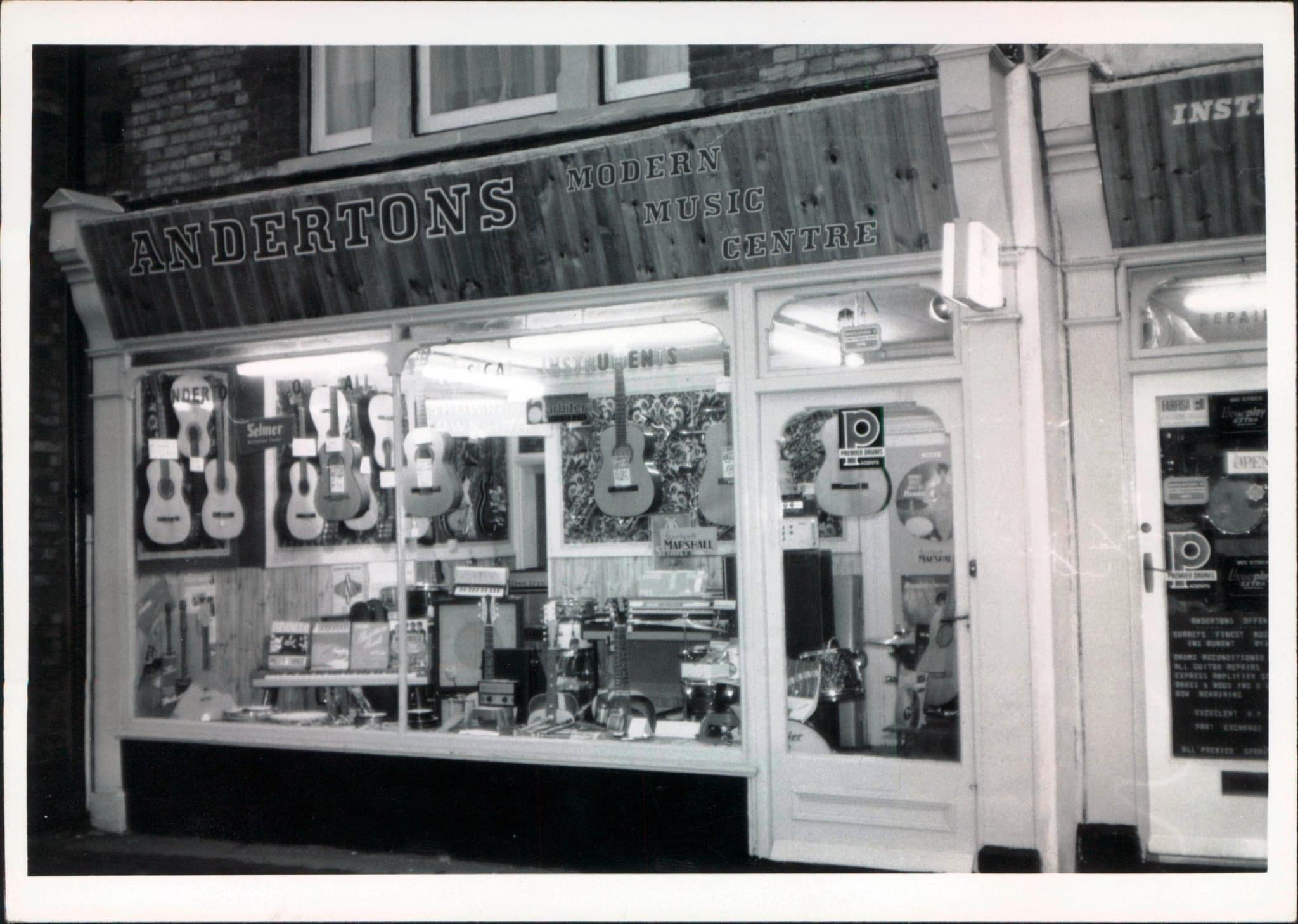
How Andertons Music’s first store in Guildford, Surrey looked like in the 1960s.
Not many family-owned music stores make it 60 years. Better yet, not many music stores are started by a retiring police officer and his 18-year-old son (who both happened to be very good semi-professional drummers), but that’s exactly how Andertons Music Company got started.
Timing is everything they say, and in 1963, a ready-to-retire Police Detective Sergeant named Harry Anderton and his ambitious teenage son, Peter, who grew up working in a friend’s music store, were witnessing the explosive impact The Beatles were making in their native England. Harry and Peter decided the time was right to take a gamble and open a music shop, and on June 6, 1964, Andertons Music Company officially opened its doors in the town of Guildford, just outside of London.
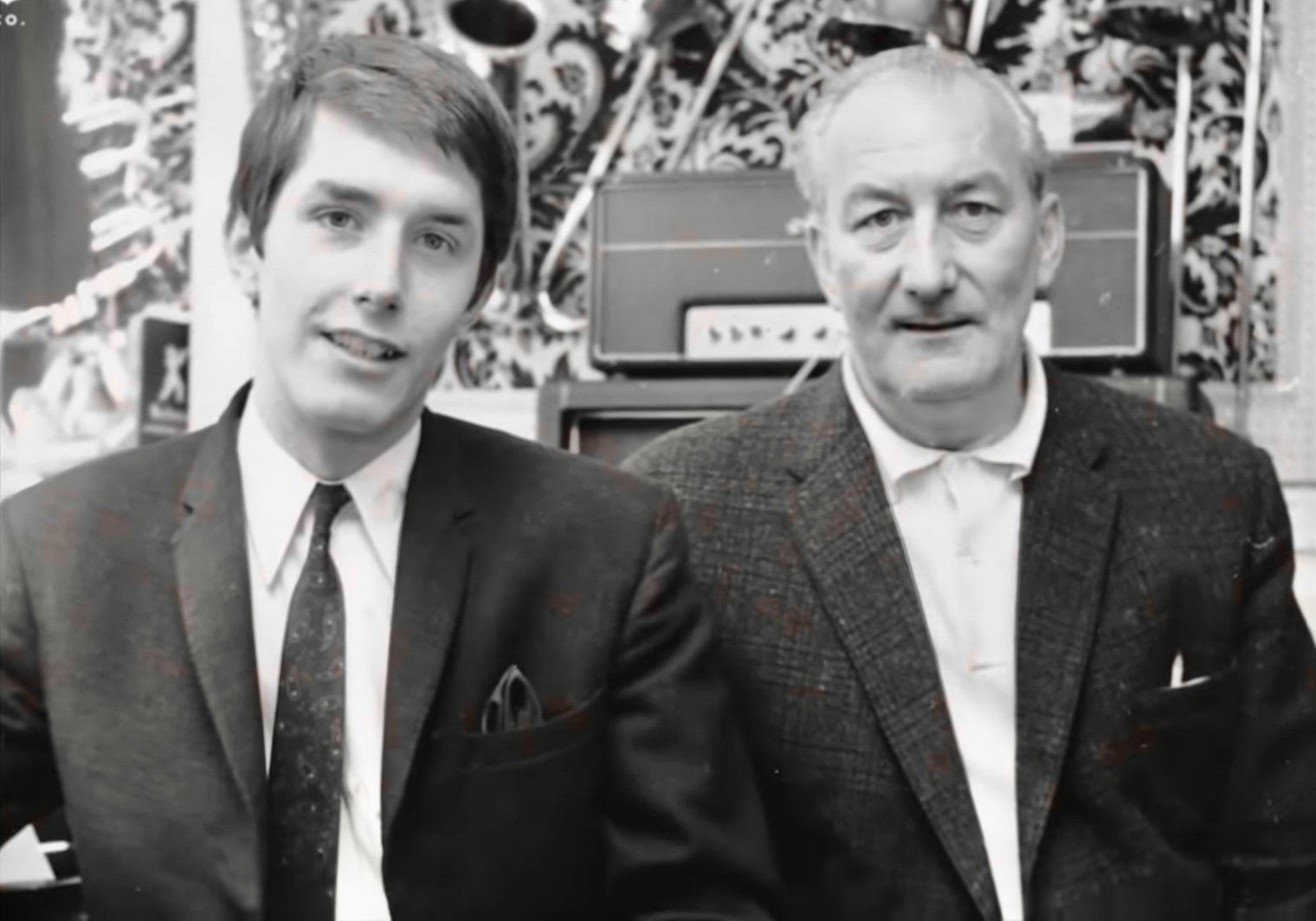
The father (Harry Anderton) and son (Peter Anderton) duo that started Andertons Music back in 1964.
The store was successful from the get-go with the biggest challenge being able to get enough stock (including Gretsch guitars and drums) to meet the demands of the local musicians. With business booming, Andertons moved into a larger shop in 1968 and started carrying electronic organs and keyboards. In the early 1970s, Andertons became one of the first music stores in England to carry synthesizers as well as stage lighting. And, most importantly, Peter Anderton welcomed a new son into the world and named him Lee.
Fast forward nearly 20 years and Andertons Music had moved into an even larger location and was still very successful. And third generation (and future Managing Director) Lee, who had grown up with a passion for the music business, joined the family business full-time just as the ‘90s started, and the music business was changing yet again. Like they say, timing is everything, especially in the Anderton family.
Lee recognized the changing customer base of the retail music business in the 1990s as more Baby Boomers had the disposable income to buy instruments that they couldn’t afford as teenagers, or like their musical heroes played. As a result, Andertons was transformed into a brighter, more organized, more visually-appealing music destination. And, like other successful retailers, Lee understood that the overall customer experience in their store now had to be a higher priority. A major business decision that Lee made at the time was embracing the power and potential of the Internet, and leading Andertons Music to be one of the early adopters of selling musical instruments and gear online.
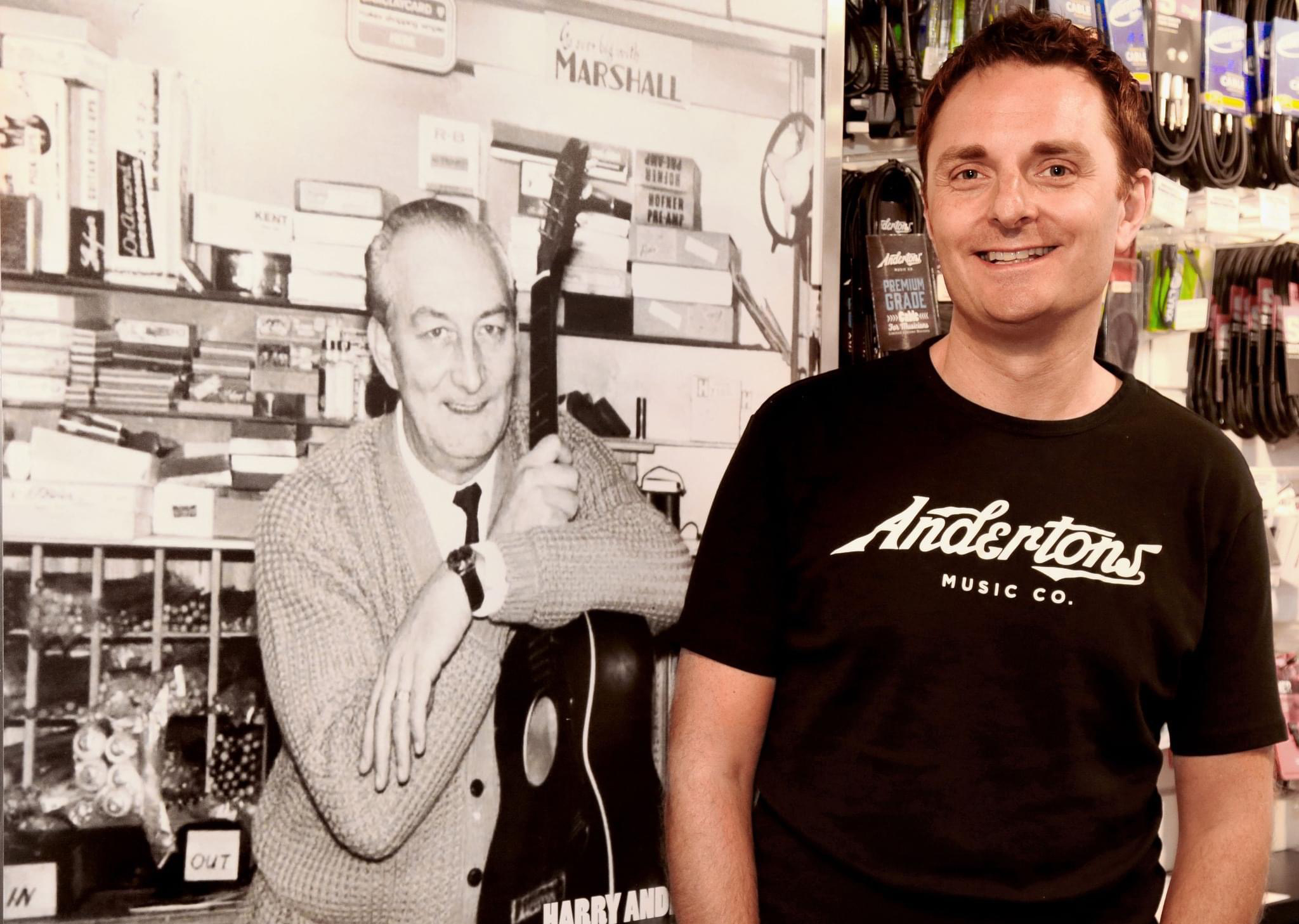
Lee Anderton in front of a photo of his grandfather, Harry, taken at Anderton’s first store in the 1960s.
Another feather in Lee’s cap during his tenure as the “Captain” of Andertons is their legendary YouTube video series that was launched in 2007 and currently has over 880,000 subscribers. Featuring the likable duo of Lee and fellow co-presenter, guitarist “Danish Pete” Honore, the conversational, informative videos aren’t made to tout product features and benefits (that’s the manufacturer’s responsibility, says Lee), they’re more about building relationships, building a music community, and growing the Andertons Music brand. If you haven’t seen one of Andertons Music’s videos, you should. They’re great and Lee, who is a natural in front of a camera, does very well as “the official face” of his family’s business. He even interviewed Fred Gretsch in 2023 as part of his “The Captain Meets” series. You can view “The Captain Meets Fred Gretsch” in the link below.
We caught up with Lee to talk about his family’s drummer gene, his business’s sales philosophy, Anderton Music’s crazy popular YouTube Channel, Gretsch guitars, and much more. Enjoy!
Your grandfather played drums, as does your father and brother. How did that gene skip you?
I guess you could say that I’ve always had this love/hate thing with drums. I can listen to the sound of a great drummer and really appreciate it. But an awful drummer sends me back to some sort of hideous childhood memory of hearing my brother, Guy, learning to play and all that kind of stuff. My brother is an amazing drummer nowadays, though. So, I don’t know, there was so much drum noise in our household that I just didn’t want to add to that level of noise. I like the fact that with a guitar, you can put the headphones on and kind of lose yourself in your very own personal space and not annoy everyone around you.
Was there an “aha! moment” or artist or event that led you to picking up the guitar?
Not really. Probably fifty percent of the reason why I learned to play the guitar was because I was already interested in the family business. I wasn’t playing the guitar then fell into the business, I was in the business and kind of fell into the guitar. I think that’s what’s made me relate to the average guitar customer as well. I don’t have a pro musician mentality towards the instruments, I have a hobbyists love of the guitar, which I think 99% of the customers in a guitar store have as well these days.
For readers not familiar with Andertons Music, how would you describe it?
Andertons is a sizeable player in the UK whose catalog is heavily focused on guitars, keyboards, and drums. We have a brand, though, that has achieved this mad feat of being a relatively small retailer with one location is the southeast of England, that’s recognized way beyond the UK. I mean, ask any guitar player in the world if they’ve heard of Andertons, and there’s a reasonable chance they’ll say, “Yes, I have.” So that’s mad. But that’s the power of the Internet and social media. It didn’t happen overnight, though, it was achieved over time.
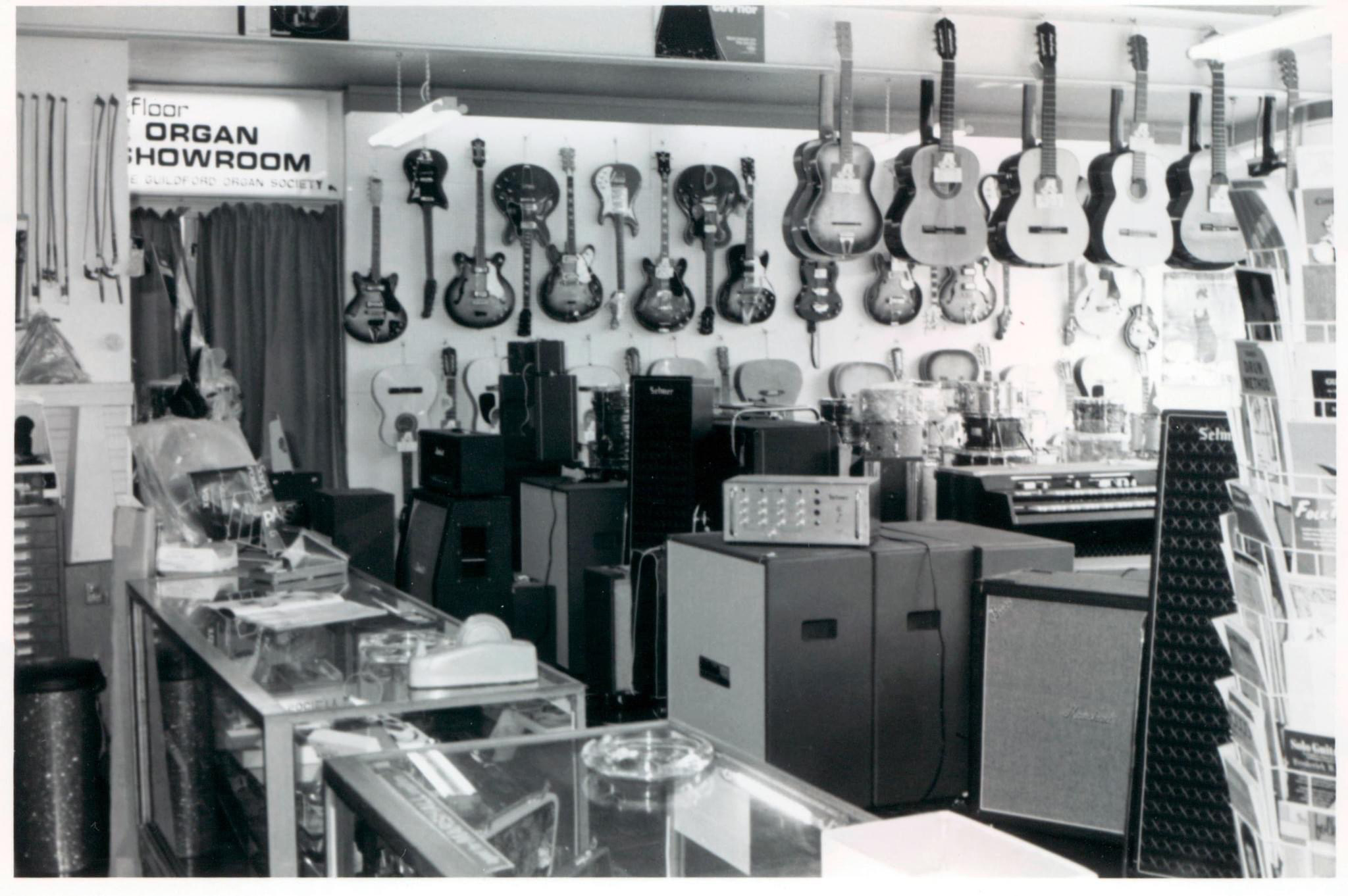
A throwback of the inside of Andertons original store in the 1960’s. Check out that “now- vintage” gear!
We’ve heard that you don’t take a SELL! SELL! SELL! customer approach at Andertons. Is that true?
Yes, I guess you can say that. We’re not here to just close the deal and to just sell customers musical instruments. I think many people in the industry misunderstand what we’re really here to do as retailers. Andertons’ mission is to create an environment within which customers, aspiring musicians, can make the best possible decision on how to spend their money on equipment. I think it’s quite an important distinction because it gives you a different view on what the customer interaction is and what the point of retail is.
So, it’s more relationship-focused than just a transaction?
Exactly. Twenty years ago, customers didn’t have a lot of choice about where to go to buy something. Now they can buy from a million places. We’re not focused on the individual sale, we’re looking at the 10, 20, 30, 40 years, or whatever, that a customer decides to participate in music and what their lifetime value could be to us. We’re here to create an environment, or a community as we’ve done online, where customers feel like they can come to, they can hang out, they can relate to, and they can trust the conversations that we’re having. So, ultimately, when they want to make that purchase, be it an impulse buy or a year down the road, we’d like to think that they’ll want to buy from us.
How would you describe the experience of shopping at your brick-and-mortar store?
We want to create a community where you can come to the store, hang out, meet your friends here, try out the instruments and ask the sales team any questions that you have. Hopefully they’ll see their interaction with Andertons as enriching the whole experience of being a musician. We’ve all been to retailers, not necessarily in the music industry, whose experience has done the exact opposite. It hasn’t been enriching at all. I think a big chunk of the retail experience is so poor that people tell themselves I’d rather have the bland, not-much-of-an-experience of buying online than the crappy experience of going to a brick-and-mortar store.
So, you think retailers are, in part, responsible for losing sales to the online world?
Yes, I do. Over the past 25 years, brick-and-mortar retailers have been their own worst enemy in the fight against losing sales to online. And now, online retailers are getting more sophisticated and trying to create a better overall experience for customers while shopping online. Retailers today are getting better, generally, because I think they’ve all realized that if you don’t, you are going bust.
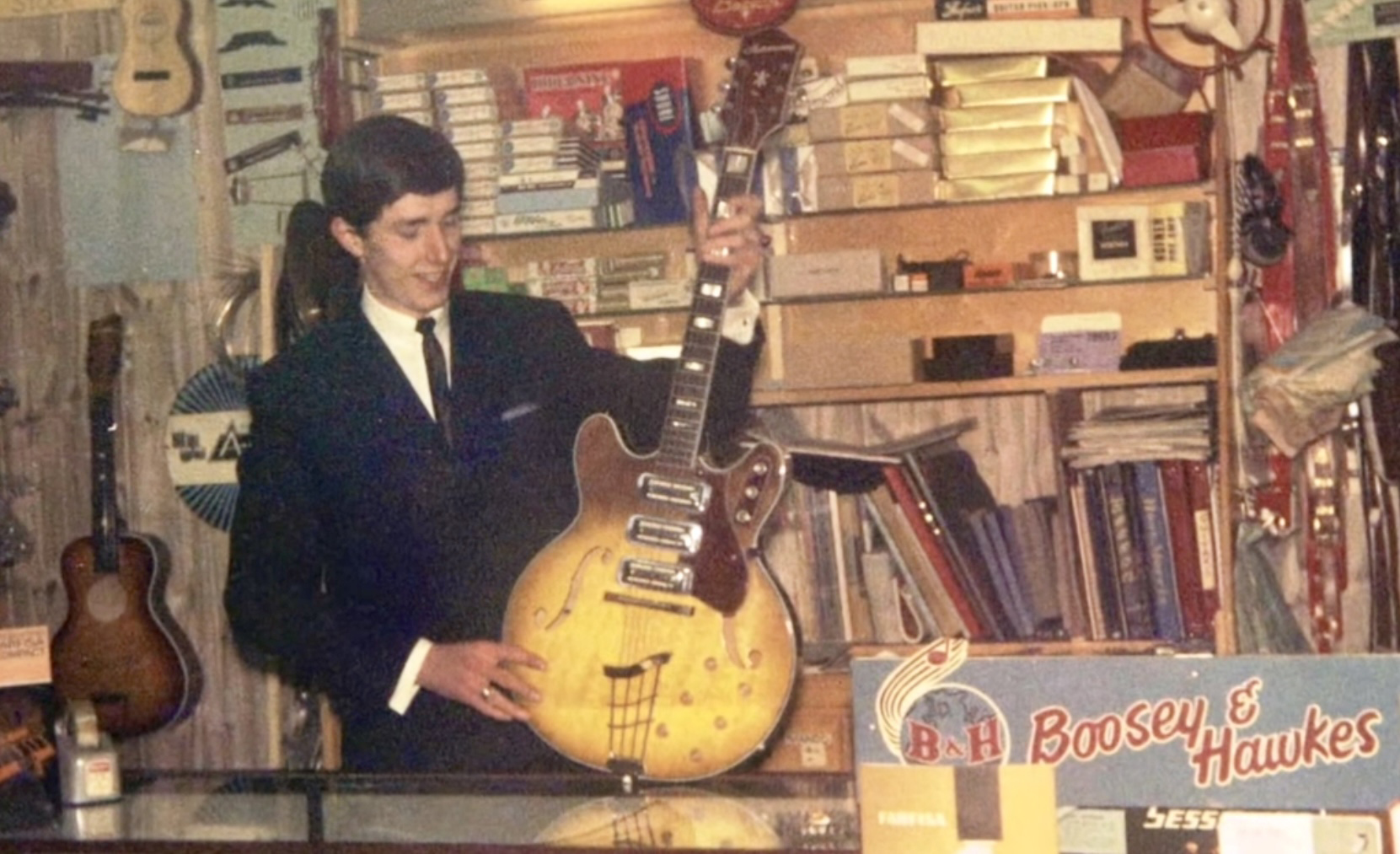
One of Lee’s favorite photos of his father holding a Harmony H-75 guitar circa 1965. (Lee would give his father a guitar exactly like this as a birthday gift in 2021.)
Do you think that a music store is still a magical kind of place?
Absolutely, especially when I see a young kid, say 10-to-13-years old, coming in with their mom and dad and their eyes have lit up because they know that today is the day that the journey of being a musician is going to start. It still gives me goosebumps when you bring the case out, open it, you’ve got the cellophane, and out of the cellophane comes a new, glistening guitar or something. That’s just a Christmas Day moment, isn’t it? And it goes deeper than that. It’s not just the endorphin rush of getting a new guitar on that day, that kid’s life is going to change for the better, I guarantee it, if they go home and learn how to play it. That’s magical.
Your YouTube video series is quite popular. What can you tell us about it?
We’ve been doing the whole online, social media thing for more than 17 years and understanding that it’s about a community thing, it’s not about being another QVC, which was the model to follow when we started back in 2007. Thank goodness we didn’t go the QVC route, because what panned out is far greater and far more fun to be involved in. We employ presenters who enhance that Andertons community feeling. We’re not employing the best players or the best salespeople, we’re trying to employ relatable people that people will enjoy watching and listening to. And we try to keep it a bit lighthearted and informative at the same time, and we try to encourage an opinion as well.
We like the conversational, authentic feel of your videos. We’re assuming that’s intentional.
Well, thanks, and yes, it is intentional. Our approach is to keep it real, mistakes and all. It’s a conscious effort to do it that way, too, it’s not staged or rehearsed or forced. We have real presenters, some who are top, world-level professional musicians, who stumble over riffs and make mistakes, but it doesn’t matter, we keep it in because that’s real. And, who cares as well? We have real audio too. We don’t put a product demonstration through post-production 25 times until it sounds better. What you hear is what the product actually sounds like.
You seem to have a real passion for electric guitars. What are your thoughts about their current state?
I do have a passion for them, and I think that overall, they’re doing just fine, thank you. The electric guitar is a funny instrument. Either the instrument is funny, or the customer is funny, or maybe it’s a little bit of both, because the enduring brands, like Gretsch, got it so right in the 1950s. I can’t think of any other industry or any other product where customers don’t want it changed from what was created 60 or 70 years ago. It’s genius; they were all brilliant. And it’s insane, it’s absolutely insane. It’s funny, but we are endlessly trying to fix things that aren’t broken in the electric guitar world.
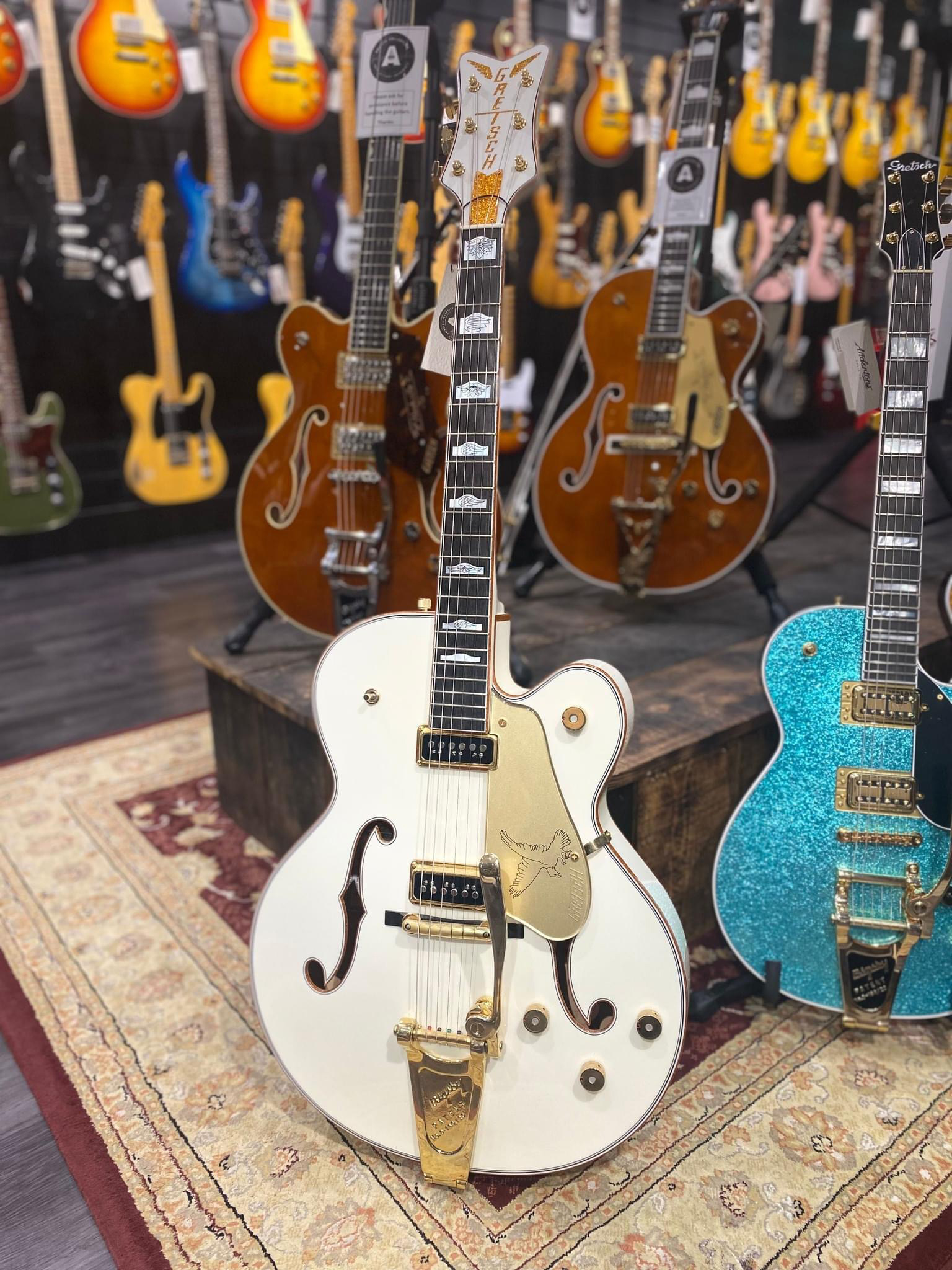
Gretsch guitars on display at Andertons Music.
Andertons has carried Gretsch guitars since Day One. What are your thoughts about today’s Gretsch guitar line?
Gretsch has done an amazing job of keeping that beating heart of magic and passion in their guitars. They have really avoided having their reputation tarnished by going too cheap and cutting corners, and they’ve done a pretty cool job of finding the right factories to work with and designing guitars that are very good at even the more affordable price points. And on the other end of the scale are the Custom Shop Gretsches which are like DaVinci-level works of art. It’s nuts.
Like you said, Gretsch got it right 70 years ago. Have they stayed true to their original 50’s recipe?
Very much so. Gretsch’s innovation back in the 50s helped establish themselves as a viable professional instrument. And they’ve done an incredible job of sustaining that, developing the business, and even building more affordable instruments, but still keeping that essence of Gretschness around their guitars. They have stayed quite focused on what is actually Gretsch, they’ve never tried to make a pointy headstock guitar for heavy metal or anything. They understand the DNA of the Gretsch brand and this is the lane that we’re in and what attracts people to the Gretsch brand, so let’s do that and do that well, instead of diluting it and trying to be all things to all people. Because when you do that, you end up being nothing to anybody.
What are you planning for your 60th Anniversary?
We’re planning a special event and we’ve also been working with a couple of brands to celebrate everything that was amazing both in 1964 and today in 2024. It’s funny, my dad doesn’t crave attention, so I’m driving these events. I’m seen as the face of Andertons, but there are a lot of people at Andertons that we owe our success to just as much as me. I just happen to be the one that sticks his ugly mug in front of people more than they do. Trust me, it takes a lot of amazing people all pulling in the same direction to get this to work. There are 140 of us. Not small, but not massive either. From the purchasing side, logistics side, technology side, customer service side, if any one of those people took their foot off the gas, it would all start to fall to pieces. There are some unbelievable, dedicated people who work here alongside of me, and I’m very, very grateful for them all.
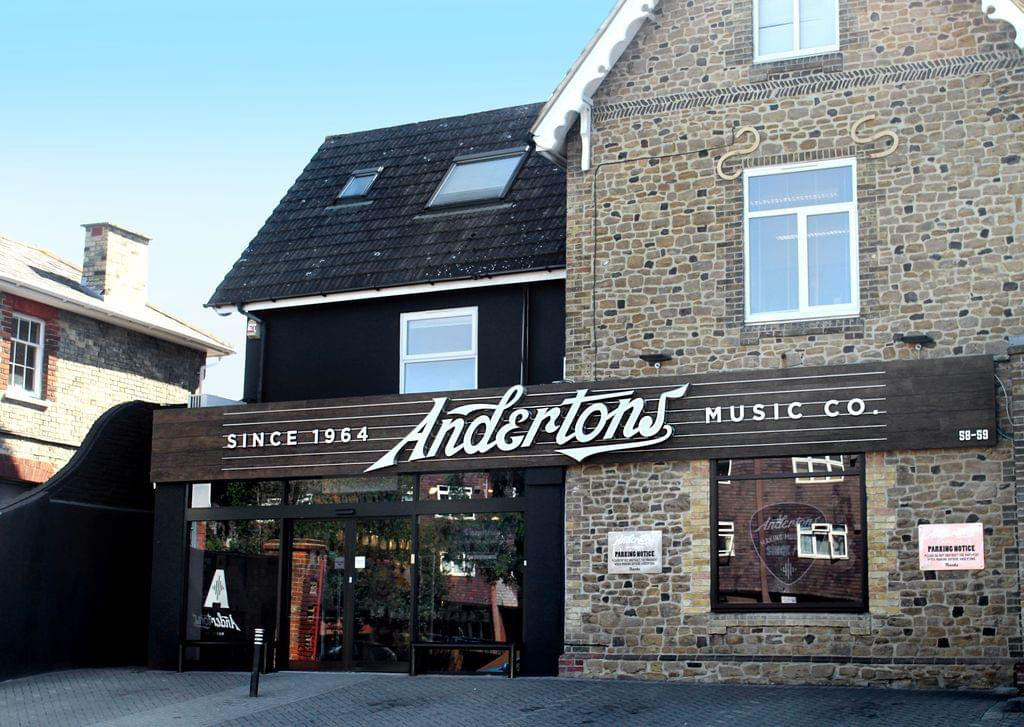
Anderton’s flagship store today in Guildford, Surrey.
Lee’s “The Captain Meets” video series featured Fred Gretsch in 2023 in honor of Gretsch’s 140th Anniversary:
Lee and Danish Pete playing, jamming, and sharing their thoughts about the limited-edition Gretsch Electromatic Pristine Series guitars:
To learn more about Andertons Music Co., visit their website and follow them on Instagram, Twitter, Facebook, and YouTube.



 Previous
Previous